
You’re on a long escalator with a phone in hand, and you want to thumb through something interesting quickly, without having to look for it. You’re sitting in gridlock traffic and tired of radio. You don’t want to skim Twitter or Facebook — you only want one story at a time, you don’t want to have to search for anything, but you still want to be surprised.
 Show Me The Next, a bare-bones web app that can be added to any smartphone home screen and consists of nothing more than a text-only story or quotation and a gray button to tap to move onto the next randomly chosen story, was designed with those readers in mind. It’s meant to be an ultra-light mobile reading experience, and it eschews videos, links, advertisements, and third-party trackers that can bloat a page and increase a reader’s data usage.
Show Me The Next, a bare-bones web app that can be added to any smartphone home screen and consists of nothing more than a text-only story or quotation and a gray button to tap to move onto the next randomly chosen story, was designed with those readers in mind. It’s meant to be an ultra-light mobile reading experience, and it eschews videos, links, advertisements, and third-party trackers that can bloat a page and increase a reader’s data usage.
“The use case in my mind is always the mobile phone, though it is on the desktop if you want it,” said Show Me The Next creator Robert Cottrell. “When you’re reading on the phone, you don’t want a lot of search and navigation. I wanted to compromise between readers’ desire for variety and their aversion to search and navigation.”
Cottrell, a longtime foreign correspondent, is currently editor of The Browser, a website that serves up five or six of what it finds to be the best stories published on the web each day. He’s also a voracious reader and a careful curator of the Internet content firehose. Show Me The Next currently draws from a pool of 1,500 stories and quotations, chosen by Cottrell, who imported stories into WordPress and had a developer recode the simple site in Javascript. Content that might pop up when readers tap “Show Me The Next” includes unusual pieces such as “The Phonetic Taste of Coffee” from the Oxford University Press blog, Wikipedia articles on unusual concepts like “Astrochicken” or short quotes from Foucault. Cottrell is feeding more content into the pool of stories and quotes every day.
 Everything in the database is evergreen and drawn from Creative Commons sites, including lesser-known outlets and not-so-viral corners of the Internet.
Everything in the database is evergreen and drawn from Creative Commons sites, including lesser-known outlets and not-so-viral corners of the Internet.
“I am reminding people how good some of these publications and writers are,” Cottrell told me. “It upset me to think how much content is sleeping in publishers’ archives. Some articles that are five years old can be every bit as interesting as articles published last week.”
Wikipedia pieces make it in, Cottrell said, because those articles are Creative Commons, but also because Wikipedia is a font of random information, and “enormously varied.”
Cottrell didn’t knowingly base Show Me The Next on any app he’d seen before, though “the comparison with Chat Roulette is not entirely frivolous. I cannot think of another app that offers readers something this simple.”
(The concept of tapping and and getting just one random but curated item at a time reminds me of Tap For News, a new app from NowThisNews, though that’s a dedicated phone app featuring videos created by the company.)
Moving forward, Cottrell said a possible business model might be to ask publishers to offer their copyrighted content in exchange for a quota of advertising pages.
“We would keep a firm ceiling on the size of those pages, but native advertising, so long as it’s simple, is a good way of paying for copyrighted new content.”
At the moment, he simply wants to figure out what stories people are reading, and whether they’re making a habit of using Show Me The Next.
“Right now it’s an experimental project,” he said. “I created it as an absolute reaction against the huge, overwhelming pages you get served by 99 percent of commercial websites. I think there is room for niche, monkish austerity.”